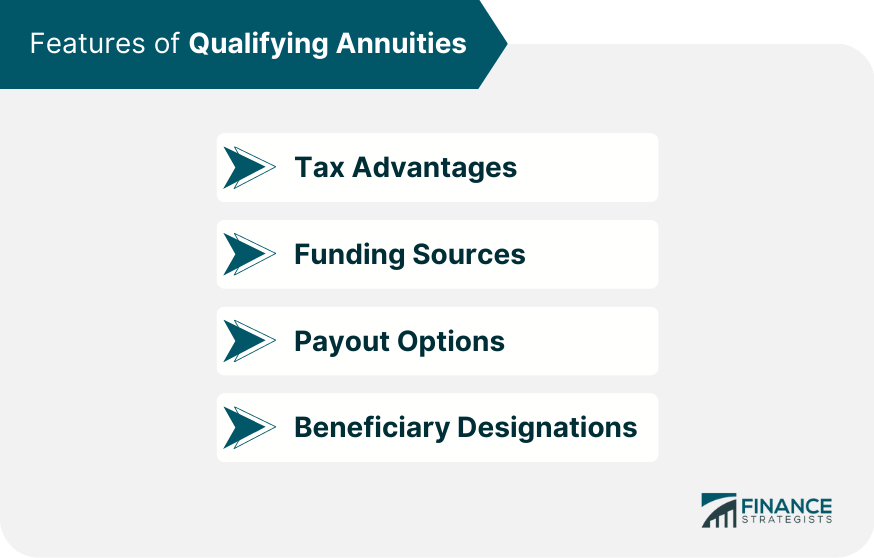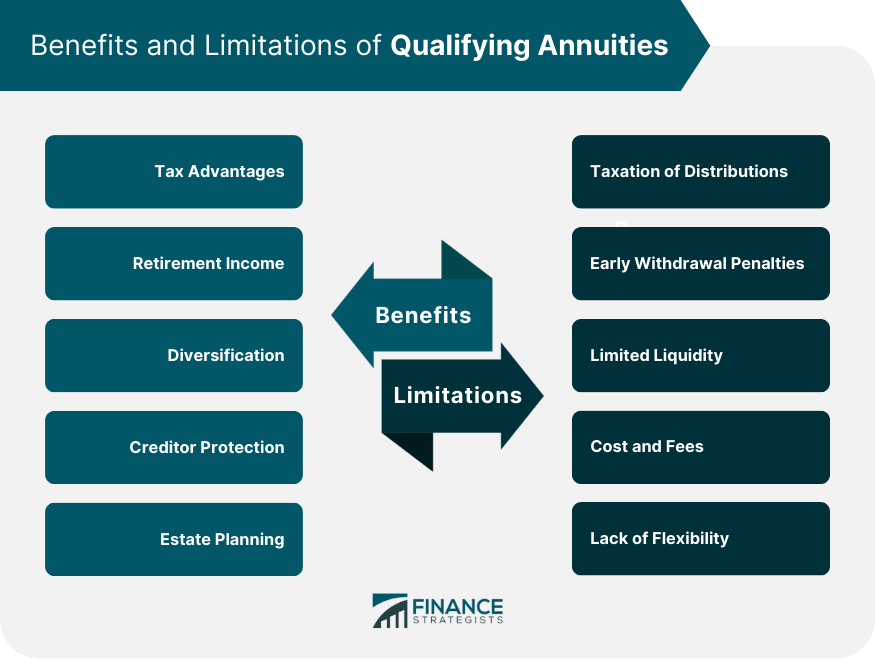A qualifying annuity is an annuity that is purchased with pre-tax dollars, typically through an employer-sponsored retirement plan such as a 401(k) or 403(b). Qualifying annuities are also known as "qualified annuities" or "tax-deferred annuities." The main advantage of a qualifying annuity is that contributions are made with pre-tax dollars, which can reduce the investor's taxable income in the year of contribution. This allows the investor to defer taxes on the investment gains until the funds are withdrawn, typically during retirement when the investor may be in a lower tax bracket. While contributions to qualifying annuities are tax-deferred, withdrawals are subject to ordinary income tax. In addition, withdrawals made before age 59 1/2 may be subject to a 10% penalty, unless an exception applies. Qualifying annuities may offer a range of investment options, including variable or fixed annuities, which provide investors with different levels of risk and return. One of the main features of qualifying annuities is their tax advantages. The contributions made to a qualifying annuity are often tax-deductible, and the growth of the investment is tax-deferred, meaning taxes are only paid upon withdrawal. Qualifying annuities can be funded through various sources, including employer-sponsored retirement plans, such as 401(k)s or 403(b)s, as well as Individual Retirement Accounts (IRAs). Qualifying annuities offer different payout options, such as lump-sum payments, systematic withdrawals, or lifetime income streams. A qualifying annuity allows the owner to designate one or more beneficiaries who will receive the remaining annuity benefits upon the owner's death. Immediate annuities begin providing income immediately after purchase, while deferred annuities accumulate funds over time and begin payouts at a later date, usually during retirement. Fixed annuities provide a guaranteed rate of return and a fixed income stream, whereas variable annuities allow for investment in various sub-accounts, offering the potential for higher returns but also carrying greater risks. Single premium annuities require a one-time, lump-sum payment, whereas flexible premium annuities allow for contributions to be made over time. Any earnings generated within the annuity are not subject to immediate income tax, allowing your investment to grow faster. You will only pay taxes on the earnings when you start receiving distributions. Qualifying annuities can provide a consistent income stream during retirement. By converting your retirement savings into an annuity, you can receive regular payments over a specified period or for your lifetime, providing financial security and helping to cover living expenses. Annuities can be used to diversify your investment portfolio. By adding an annuity to your retirement assets, you can reduce overall investment risk. Annuities often offer a fixed interest rate, indexed returns, or the potential for market participation, allowing you to tailor your investment strategy to your risk tolerance and financial goals. In some cases, qualifying annuities may offer protection from creditors. Assets held within qualified retirement accounts, including annuities, are often shielded from bankruptcy proceedings or legal actions, providing an added layer of asset protection. Qualifying annuities can be advantageous for estate planning purposes. They offer the option to name beneficiaries who will receive the remaining value of the annuity upon your death. This can allow for the efficient transfer of assets outside of probate and potentially provide a steady income stream for your beneficiaries. While qualifying annuities offer tax-deferred growth, the distributions you receive from the annuity are generally subject to income tax. Depending on the type of annuity and distribution options chosen, the taxation can vary. It's crucial to understand the tax implications and consult with a tax advisor to plan accordingly. Withdrawing funds from a qualifying annuity before reaching the age of 59½ may result in early withdrawal penalties imposed by the IRS. These penalties are in addition to any applicable income taxes on the withdrawn amount. Annuities are designed as long-term financial vehicles, and they often come with limited liquidity. Depending on the annuity contract, surrender charges or fees may be applied if you withdraw more than a certain percentage of the accumulated value within a specific period. Annuities can have various fees, such as administrative fees, mortality and expense charges, investment management fees, and surrender charges. These fees can vary between annuity providers and may impact the overall return on your investment. Annuity contracts typically have specific terms and conditions that limit your flexibility to make changes once the contract is established. Changing the annuity's investment options, withdrawal provisions, or beneficiary designations may come with restrictions or fees. Before purchasing a qualifying annuity, it is essential to research and compare providers to find the best fit for your financial goals. Ensure you fully understand the contract terms, including fees, payout options, and potential penalties for early withdrawal. Given the complexities of qualifying annuities, seeking advice from a financial professional can be extremely beneficial. Qualifying annuities are purchased with pre-tax dollars and serve as a powerful financial tool, especially within the sphere of retirement planning. They offer considerable tax advantages, a range of funding sources, diverse payout options, and the capability to designate beneficiaries. Whether immediate or deferred, fixed or variable, single premium or flexible premium, these annuities provide an array of choices catering to individual financial needs and circumstances. They provide a reliable stream of income in retirement, aid in tax-deferred growth, and offer protection against longevity risk, ensuring you do not outlive your savings. However, like any financial product, they come with their own set of limitations, including taxation of distributions, early withdrawal penalties, limited liquidity, lack of flexibility, and costs that can affect overall returns. Therefore, it is crucial to conduct thorough research, understand contract terms, and seek professional financial advice before purchasing a qualifying annuity. As the world of finance continues to evolve, staying abreast of the latest trends and regulatory changes concerning annuities becomes paramount in making sound financial decisions.What Is a Qualifying Annuity?
Features of Qualifying Annuities
Tax Advantages
Funding Sources
Payout Options
Beneficiary Designations

Types of Qualifying Annuities
Immediate Versus Deferred Annuities
Fixed Versus Variable Annuities
Single Premium Versus Flexible Premium Annuities
Benefits of Qualifying Annuities
Tax Advantages
Retirement Income
Diversification
Creditor Protection
Estate Planning
Limitations of Qualifying Annuities
Taxation of Distributions
Early Withdrawal Penalties
Limited Liquidity
Cost and Fees
Lack of Flexibility

How to Purchase a Qualifying Annuity
Researching and Comparing Providers
Understanding Contract Terms
Seeking Professional Financial Advice
Final Thoughts
Qualifying Annuity FAQs
A qualifying annuity is a tax-deferred annuity that meets specific requirements of the Internal Revenue Code, including being purchased with pre-tax dollars from an eligible retirement plan, such as a 401(k) or IRA.
The main benefit of a qualifying annuity is the tax-deferred growth, which allows your money to grow without being subject to taxes until you withdraw it. Additionally, a qualifying annuity can provide a steady stream of income during retirement.
To be considered a qualifying annuity, it must be purchased with pre-tax dollars from an eligible retirement plan, and must also meet certain distribution requirements, such as a minimum distribution amount based on your age.
No, you cannot make contributions to a qualifying annuity if you are already retired. However, you can continue to receive distributions from the annuity as long as it meets the minimum distribution requirements.
Distributions from a qualifying annuity are taxed as ordinary income in the year they are received. The amount of tax you pay will depend on your overall income and tax bracket. If you take a distribution before age 59 ½, you may also be subject to an additional 10% early withdrawal penalty.
True Tamplin is a published author, public speaker, CEO of UpDigital, and founder of Finance Strategists.
True is a Certified Educator in Personal Finance (CEPF®), author of The Handy Financial Ratios Guide, a member of the Society for Advancing Business Editing and Writing, contributes to his financial education site, Finance Strategists, and has spoken to various financial communities such as the CFA Institute, as well as university students like his Alma mater, Biola University, where he received a bachelor of science in business and data analytics.
To learn more about True, visit his personal website or view his author profiles on Amazon, Nasdaq and Forbes.













